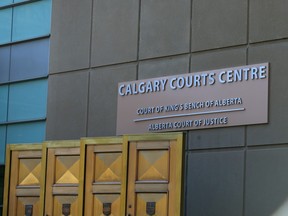Defence lawyer Pawel Milczarek said he didn’t put his client on the witness stand because of the vagueness of the Crown’s case against him

The evidentiary portion of Calgary terrorism suspect Jamal Borhot’s lengthy trial concluded Thursday without the accused testifying in the case.
But defence lawyer Pawel Milczarek said he didn’t put his client on the witness stand because of the vagueness of the Crown’s case against him.
“Every time the defence has asked for the Crown to formally outline its position about what it is alleging Mr. Borhot did or what activity of Islamic State he allegedly enhanced over this period of 11 months, they have refused,” Milczarek said outside court, reading from a prepared statement.
“The Crown has been permitted to tender over 100 transcripts of personal conversations and approximately 8,000 pages of social media without ever outlining what alleged act in 2013-2014 these may relate to.”
For example, Milczarek pointed to the wording of the last of three allegations against his client that he travelled to Syria and participated in the activities of ISIS between May 2013 and April 2014.
That charge reads that during those dates Borhot “in Syria and elsewhere, did knowingly participate or contribute to, directly or indirectly, the activities of a terrorist group, to wit: the Islamic State, by committing acts, including one or more terrorist activities for the purpose of enhancing the ability of the terrorist group to facilitate or carry out a terrorist activity.”
“The offence is broad in terms of facts,” Milzcarek said.
“For example, a person could be charged for giving money to a person on the street holding a sign that says ‘former ISIS fighter.’”
Justice Corina Dario, who concluded the case by giving three rulings, agreed in part, saying the defence could present closing arguments after the Crown so it would know the full case against Borhot.
Milczarek did call two witnesses, an Arabic interpreter who testified about wiretapped conversations entered by the Crown and an expert on Canadian foreign fighters in Syria.
In Canadian criminal trials, the side that calls evidence last normally will present its final submissions first.
“The charges themselves are very broad,” Dario said, in agreeing the defence should have a clearer understanding of the allegations against Borhot before making submissions.
“Fairness dictates the Crown should argue first.”
The Court of King’s Bench also made a ruling which could see Borhot’s charges stayed without further evidence.
The federal Attorney General’s department has withheld information from the defence it says falls under a section of the Canadian Security Intelligence Services Act designed to protect the life and security of human sources.
Dario will review that information privately to determine “whether trial fairness is materially affected due to non-disclosure of the withheld information.”
Among the potential remedies if that is the case would be a stay of proceedings, she noted.
Both sides will provide written submissions, the Crown by Sept. 6 and Milczarek by Sept. 26, with a prosecution reply by Sept. 30, before Dario will hear oral arguments on Oct. 1 and 2.
Borhot remains at liberty pending an outcome to the case.